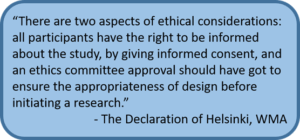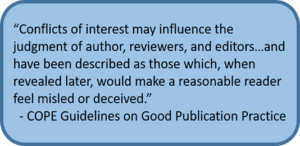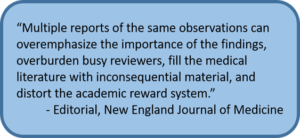
Recently, a researcher brought up the topic of ethics in research and how a simple oversight had led to rejection. This fueled a discussion about ethical declarations and related issues at the journal submission stage, which highlighted how little authors actually know about the topic. This deficiency is underlined by a 2018 Editage Global Author Survey, which reveals that 10-25% of respondents didn’t know or were confused about ethics statements, what plagiarism means, duplicate submissions, and even determining authorship, while 31% had never heard about global ethics-related bodies such as COPE (Committee on Publication Ethics) or ICMJE (International Committee of Medical Journal Editors).
Scientific research is based on trust, integrity, and the ethical conduct of researchers across the globe. On the other hand, growing commercialization and competition is chipping away at the ethical principles that guide scientific research and publication. Renowned American computer scientist Bill Joy once said, “We can’t simply do our science and not worry about the ethical issues.” Lack of ethical declarations or any kind of ethical misconduct in research can lead to desk rejection, article retractions, hurt your academic career, and even discredit authors and their research findings. The best way for authors to avoid this quagmire is to learn more about publishing ethics and check your manuscript readiness before submission. Here’s something to get you started.
Ethical declarations every author needs to submit
Ethical misconduct can result in rejection, and while authors must ensure their study is important and novel, the job does not end there. Here are the top ethical declarations needed at the submission stage.
1. Statements of ethical approval
The first ethical declaration and one of the most important aspects of research is to ensure appropriate and ethical handling of people or animals involved in the study. Any use of information, patient data, or case studies in your manuscript without approval from relevant bodies and participants is unethical and can lead to rejection.
Types of ethical approvals
Authors first need written consent (with approval number) from an ethical approval committee/Institutional Review Board as well as from the participants in the study. Where children are involved, authors should submit informed consent from their parents, guardians or legal representatives with their manuscript.

What authors should do
Statements of ethical approvals are one of the key ethical declarations on submission that indicate the privacy and consent of study participants have been maintained in research projects. So, be sure to get all the relevant approvals and permissions in advance to ensure your research study is ethically compliant, and your findings are seen as credible. If researchers are unable to obtain consent, they should eliminate all personal details of the participants from the manuscript, including in supplementary materials and visuals.
2. Declaration of interest
At time of submission, journals require researchers to submit ethical declarations of any conflicts of interest that may impede an objective and transparent editorial and review process. While not uncommon or bad, authors are responsible for identifying and reporting potential conflicts to indicate their ability to be unbiased researchers. Failure to declare competing interests, when identified, can lead to journal rejection, so be sure to add this ethical declaration to your submission package.
Types of competing interests
Conflicts of interest can arise from personal, financial, and professional affiliations or relationships. Any bias toward academic methods and processes or toward a specific political standpoint can impact the research results. Additionally, any instances where authors stand to gain financially or commercially, in terms of gifts, sponsorships, funding, or consultancy fees from companies who benefit on research being published are conflicts of interest and require an ethical declaration. Finally, competing interests that influence how articles are reviewed, research is conducted, or how papers submitted by journal staff are evaluated are also problematic.

What authors should do
The best approach is full disclosure, both with the journal and your funders. Submit ethical declarations that acknowledge all sources of funding or other sources of support received while conducting your research, divulge any commercial or tangible benefits you may gain by publishing your manuscript, and mention all personal or professional relationships that could be construed as conflicts of interest. If there is no potential conflict of interest, submit an ethical declaration mentioning this. Check if your journal requires a specific form to be filled, or refer to the ICMJE guidelines and use the form and ethical declaration examples provided there to create appropriate ethics statements for journal submission.
3. Manuscript submission-related ethical declarations
Some researchers may be tempted to submit to multiple journals to save time and boost their chances of acceptance, while others may have published portions of the research earlier. Authors who submit manuscripts without this ethical declaration or without disclosing this information could face duplicate publication or copyright infringement charges, which is a serious ethical offence.
Types of submission misconduct
Submitting manuscripts to multiple journals at the same time or attempting to republish content that has been published earlier without the right permissions or ethical declarations is an ethical violation. Consolidating related papers and publishing it as a larger, more comprehensive paper is seen as unethical, as is ‘salami slicing’ a research study to publish it as smaller papers to boost the publication list.

What authors should do
Journals require authors to submit ethical declarations disclosing any previous or pending publication of manuscript content in journal communications, conferences, or as preprints online at the time of submission. When using data (figures/tables) from published work, be sure to include signed permissions to use the content. In instances of secondary publication, authors must check and follow the ICMJE stipulated guidelines.
Research misconduct is a serious issue and researchers found guilty of it stand to lose their credibility in the academic community with little to no chance of professional advancement. This makes it crucial for authors to follow all the ethical guidelines and submit the required ethical declarations to indicate their integrity and ability to be transparent in their work. Along with these three key ethical declarations, authors must watch out for unethical authorship, data fabrication or falsification, and plagiarism well before they submit to a journal.
To ensure you’ve done everything required for submission, run your work through the comprehensive manuscript readiness check by Researcher.Life, which helps authors create submission-ready articles and maximize their chance of publication success.


